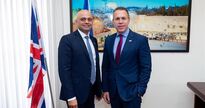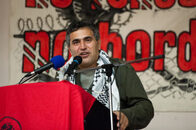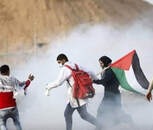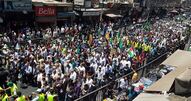2 july 2019

Israel’s Channel 7 said that the Israeli government asked Britain recently to take a decision criminalizing the Hamas Movement and the Boycott, Divestment and Sanctions (BDS) movement.
According to the channel, this request was made during a meeting in Tel Aviv on Monday between Israeli public security minister Gilad Erdan and British home secretary Sajid Javid.
Such request by Erdan regarding Hamas is considered idiotic because Hamas is already among other 74 groups outlawed by the British regime.
According to the channel, this request was made during a meeting in Tel Aviv on Monday between Israeli public security minister Gilad Erdan and British home secretary Sajid Javid.
Such request by Erdan regarding Hamas is considered idiotic because Hamas is already among other 74 groups outlawed by the British regime.

German authorities barred Palestinian-Canadian journalist Khaled Barakat from speaking at a Palestine solidarity event in Berlin, claiming his “anti-Semitic” speeches posed a threat to public order and could undermine relations between the country and Israel.
The activist has been prohibited from attending future political events and threatened with up to one year in prison, marking another success in the Israel lobby’s bid to clamp down on criticism abroad.
Barakat had been invited to speak at an Arab community event in Berlin on 22 June to discuss Palestinian liberation and its implications for other Arab communities, as well as US President Donald Trump’s so-called Deal of the Century.
But, he was accosted by police on arrival.
“As soon as we left the U-Bahn station nearest the venue my wife and I noticed heavy police presence in the area, including multiple vans full of police,” Barakat told The Electronic Intifada.
“I was approached by a group of police and one officer spoke to me. He said: ‘You have an event here tonight and you are the speaker … you cannot speak.’”
The police took Barakat and his wife to a police station where government officials handed him an eight-page document prohibiting him from political activity.
The document, issued by the Berlin Foreigners Registration Office and seen by The Electronic Intifada, states in German that Barakat faces a ban on participating in specific events and a general “limit on your political activity until you leave the Federal Republic of Germany.”
“They [representatives of the foreigners office] told me that I am banned from speaking at any public event in Berlin and even attending meetings and gatherings,” Barakat said.
He said was also ordered to avoid social events of “more than 10 people,” or face a one-year prison sentence.
Barakat’s wife is also a Palestinian rights activist, but not Palestinian and she was not banned.
“After I was told to acknowledge that I had received the document we were released from the police station. We also noticed significant police presence on the way home,” Barakat added.
German-Israeli relations trump free speech
Barakat’s case mirrors that of Palestinian activist Rasmea Odeh who was smeared in the German media before being banned from speaking at an event in Berlin for International Women’s Day earlier this year.
She was finally forced to leave the country.
The official document states that Barakat’s political activities “pose a threat to public safety,” that his talk would “impair and endanger the peaceful coexistence of Germans and foreigners” and that Germany’s relationship to Israel could be “considerably endangered” if he were allowed to speak.
The document also states that it believes Barakat might be working for the Popular Front for the Liberation of Palestine – PFLP – which the document notes is listed as a “terrorist” organization by the US, Israel and the European Union.
However it acknowledges that the group is “not prohibited” in Germany. Israel considers virtually all Palestinian political parties and organizations that militarily resist occupation to be “terrorist” groups.
“If you look at the campaigns being carried out by Israel and the Ministry of Strategic Affairs against BDS organizations around the world, or Students for Justice in Palestine in the US, they are trying their best to criminalize all movements for Palestine or even human rights organizations by using so-called connections to Hamas and the PFLP,” Barakat said.
Barakat observed that in the leaked Al Jazeera undercover film The Lobby–USA, “representatives from the Foundation for the Defense of Democracies openly advocated for this tactic and now we are seeing it in practice.”
BDS stands for boycott, divestment and sanctions – a global campaign for Palestinian rights modeled on the one that helped end apartheid in South Africa during the 1980s.
The Foundation for the Defense of Democracies is a Washington-based neoconservative think tank and agent of Israel’s strategic affairs ministry.
The document goes on to list a number of speeches given by Barakat in Germany, but fails to cite any examples of anti-Semitism.
Barakat believes this is because the authorities need to “exaggerate in order to justify their repressive measures.”
Despite offering no examples of anti-Jewish bigotry on Barakat’s part, the government order insists the draconian ban on his political activities is justified because “the public should be protected from your expected anti-Semitic and anti-Israel statements.”
Fear of a united front
Barakat strongly refutes the claim that his speech would have caused tensions between Jewish and Arab communities in Berlin and asserts, rather, that authorities are trying to prevent a united front from emerging.
“The same forces advocating for and issuing this political ban against me are involved in repressing Jewish voices that criticize Zionism, Israeli policy and German policy on Israel,” he said.
Barakat noted that under Israel lobby pressure, the director of the Jewish Museum Berlin was recently forced to resign.
Moreover, the group Jewish Voice for Just Peace in the Middle East had its bank account closed. And, two Jewish activists with Israeli nationality are on trial for criminal charges alongside a Palestinian activist from Gaza for interrupting an Israeli politician who supported Israel’s 2014 assault on Gaza that killed more than 2,200 Palestinians including 550 children.
In recent years, German music festivals have also been banning international artists who refuse to denounce the nonviolent BDS campaign for Palestinian rights.
These facts, as well as the German parliament’s recent resolution smearing the BDS movement as anti-Semitic make it increasingly difficult for activists to advocate for Palestinian human rights.
The people who face the brunt of these attacks are Palestinians themselves.
The racism, political bans and growing repression aside, Barakat remains undeterred: “I firmly believe that the vast majority of people in Germany support justice for the Palestinian people and reject Israeli war crimes and apartheid, but they live in fear and I understand.”
~ Electronic Intifada/Days of Palestine
The activist has been prohibited from attending future political events and threatened with up to one year in prison, marking another success in the Israel lobby’s bid to clamp down on criticism abroad.
Barakat had been invited to speak at an Arab community event in Berlin on 22 June to discuss Palestinian liberation and its implications for other Arab communities, as well as US President Donald Trump’s so-called Deal of the Century.
But, he was accosted by police on arrival.
“As soon as we left the U-Bahn station nearest the venue my wife and I noticed heavy police presence in the area, including multiple vans full of police,” Barakat told The Electronic Intifada.
“I was approached by a group of police and one officer spoke to me. He said: ‘You have an event here tonight and you are the speaker … you cannot speak.’”
The police took Barakat and his wife to a police station where government officials handed him an eight-page document prohibiting him from political activity.
The document, issued by the Berlin Foreigners Registration Office and seen by The Electronic Intifada, states in German that Barakat faces a ban on participating in specific events and a general “limit on your political activity until you leave the Federal Republic of Germany.”
“They [representatives of the foreigners office] told me that I am banned from speaking at any public event in Berlin and even attending meetings and gatherings,” Barakat said.
He said was also ordered to avoid social events of “more than 10 people,” or face a one-year prison sentence.
Barakat’s wife is also a Palestinian rights activist, but not Palestinian and she was not banned.
“After I was told to acknowledge that I had received the document we were released from the police station. We also noticed significant police presence on the way home,” Barakat added.
German-Israeli relations trump free speech
Barakat’s case mirrors that of Palestinian activist Rasmea Odeh who was smeared in the German media before being banned from speaking at an event in Berlin for International Women’s Day earlier this year.
She was finally forced to leave the country.
The official document states that Barakat’s political activities “pose a threat to public safety,” that his talk would “impair and endanger the peaceful coexistence of Germans and foreigners” and that Germany’s relationship to Israel could be “considerably endangered” if he were allowed to speak.
The document also states that it believes Barakat might be working for the Popular Front for the Liberation of Palestine – PFLP – which the document notes is listed as a “terrorist” organization by the US, Israel and the European Union.
However it acknowledges that the group is “not prohibited” in Germany. Israel considers virtually all Palestinian political parties and organizations that militarily resist occupation to be “terrorist” groups.
“If you look at the campaigns being carried out by Israel and the Ministry of Strategic Affairs against BDS organizations around the world, or Students for Justice in Palestine in the US, they are trying their best to criminalize all movements for Palestine or even human rights organizations by using so-called connections to Hamas and the PFLP,” Barakat said.
Barakat observed that in the leaked Al Jazeera undercover film The Lobby–USA, “representatives from the Foundation for the Defense of Democracies openly advocated for this tactic and now we are seeing it in practice.”
BDS stands for boycott, divestment and sanctions – a global campaign for Palestinian rights modeled on the one that helped end apartheid in South Africa during the 1980s.
The Foundation for the Defense of Democracies is a Washington-based neoconservative think tank and agent of Israel’s strategic affairs ministry.
The document goes on to list a number of speeches given by Barakat in Germany, but fails to cite any examples of anti-Semitism.
Barakat believes this is because the authorities need to “exaggerate in order to justify their repressive measures.”
Despite offering no examples of anti-Jewish bigotry on Barakat’s part, the government order insists the draconian ban on his political activities is justified because “the public should be protected from your expected anti-Semitic and anti-Israel statements.”
Fear of a united front
Barakat strongly refutes the claim that his speech would have caused tensions between Jewish and Arab communities in Berlin and asserts, rather, that authorities are trying to prevent a united front from emerging.
“The same forces advocating for and issuing this political ban against me are involved in repressing Jewish voices that criticize Zionism, Israeli policy and German policy on Israel,” he said.
Barakat noted that under Israel lobby pressure, the director of the Jewish Museum Berlin was recently forced to resign.
Moreover, the group Jewish Voice for Just Peace in the Middle East had its bank account closed. And, two Jewish activists with Israeli nationality are on trial for criminal charges alongside a Palestinian activist from Gaza for interrupting an Israeli politician who supported Israel’s 2014 assault on Gaza that killed more than 2,200 Palestinians including 550 children.
In recent years, German music festivals have also been banning international artists who refuse to denounce the nonviolent BDS campaign for Palestinian rights.
These facts, as well as the German parliament’s recent resolution smearing the BDS movement as anti-Semitic make it increasingly difficult for activists to advocate for Palestinian human rights.
The people who face the brunt of these attacks are Palestinians themselves.
The racism, political bans and growing repression aside, Barakat remains undeterred: “I firmly believe that the vast majority of people in Germany support justice for the Palestinian people and reject Israeli war crimes and apartheid, but they live in fear and I understand.”
~ Electronic Intifada/Days of Palestine
1 july 2019

Spare a thought for the human rights groups in Palestine committed to documenting, holding to account, and otherwise having to deal with Israel’s racist regime.
Groups such as Al Haq, B’Tselem, Adalah and Al-Mezan are just some of the many groups which create an array of valuable reports, papers, videos, press campaigns and other publications. They also help represent and defend Palestinians facing Israel’s racist military “courts” system.
They do valuable work, and it is a thankless task. Dealing with the system of “military justice” – which has a 99.7 per cent conviction rate – must be like butting so many heads up against multiple walls. Expecting “justice” from a regime of military occupation is pointless.
And indeed, B’Tselem in 2016 made the decision that they would cease issuing formal complaints to Israel’s military occupation authorities in the West Bank. Accurately calling the process “the occupation’s fig leaf,” B’Tselem said there was “no longer any point in pursuing justice and defending human rights by working with a system whose real function is measured by its ability to continue to successfully cover up”.
The report the group released upon making this announcement documents how these cover-ups work. Since late 2000, when the Second Intifada began, B’Tselem had lodged 739 complaints within the occupation authorities’ internal system.
These were instances in which Israeli soldiers murdered, injured or physically abused Palestinians, or damaged their property – including cases of Palestinians forcibly used by Israeli soldiers as human shields. In the vast majority (three-quarters) of these 739 cases either the “investigation” was closed with no further action taken or had never even been launched in the first place.
B’Tselem states that “only in very rare instances” were any charges made against the soldiers concerned.
This is very obviously a system designed to whitewash the Israeli army’s image. The true function of this fig leaf is as a kind of international public relations. Journalists reporting on the latest Israeli crime quite regularly report – almost without fail – that Israel has “launched an investigation” into the murder or abuse of Palestinians by its soldiers – as if it were some abnormality.
Of course, a short while later, when the mildly critical attention of said journalists has waned, the investigation is quietly dropped, or concluded with some token rap on the knuckles.
As the group candidly admitted, “B’Tselem’s cooperation with the military investigation and enforcement system has not achieved justice, instead lending legitimacy to the occupation regime and aiding to whitewash it.”
It seems to me it was the right decision to withdraw from cooperating with this sham process.
There is an argument to be made that there should be a total boycott of the entire fabricated system of military “justice” in the occupied West Bank. This is a step some Palestinian political prisoners have actually taken.
Samidoun – the political support network for Palestinian prisoners – reports that Ghassan Zawahreh just this month declared a boycott of Israel’s military courts. Zawahreh is a prominent left-wing activist in Dheisheh refugee camp, near the West Bank city of Bethlehem. He has spent years in and out of Israeli dungeons and is currently interned by Israeli occupiers without charge or trial – their system of so-called “administrative detention”.
Zawahreh sent a letter to the court through his lawyer stating that, “administrative detention is a heinous crime for the ages. What is even more criminal is the occupation’s attempts to mislead through mock courts and charades where the executioner and the ruler, dressed up in military suits, represent the occupation and its crimes.
“I will not be a part of this charade until administrative detention is ended once and for all. I reject this court and refuse to be represented by anyone in it”.
There are currently about 500 Palestinians held in “administrative detention”. Palestinians have been jailed for years at a time without charge or trial under these repeated orders. There are currently more than 5,200 total Palestinian prisoners in Israeli jails.
Zawahreh’s stance is a brave move that could lead to further dire consequences for him. Yet until the Israeli occupation is forced to end, such consequences for Palestinians are an inevitability; he may feel he has nothing to lose.
Israel’s occupation will not end until ordinary voters, like you and I, force our governments to end political and military aid to Israel. A good first step in the right direction would be the immediate and total end to all arms sales to Israel. Jeremy Corbyn and other leading figures in the Labour Party have rightly called for an end to all arms sales to Saudi Arabia.
Let’s push them to do the same for Israel.
- Asa Winstanley is an investigative journalist living in London who writes about Palestine and the Middle East. He has been visiting Palestine since 2004 and is originally from south Wales. He writes for the award-winning Palestinian news site The Electronic Intifada where he is an associate editor and also a weekly column for the Middle East Monitor.
Groups such as Al Haq, B’Tselem, Adalah and Al-Mezan are just some of the many groups which create an array of valuable reports, papers, videos, press campaigns and other publications. They also help represent and defend Palestinians facing Israel’s racist military “courts” system.
They do valuable work, and it is a thankless task. Dealing with the system of “military justice” – which has a 99.7 per cent conviction rate – must be like butting so many heads up against multiple walls. Expecting “justice” from a regime of military occupation is pointless.
And indeed, B’Tselem in 2016 made the decision that they would cease issuing formal complaints to Israel’s military occupation authorities in the West Bank. Accurately calling the process “the occupation’s fig leaf,” B’Tselem said there was “no longer any point in pursuing justice and defending human rights by working with a system whose real function is measured by its ability to continue to successfully cover up”.
The report the group released upon making this announcement documents how these cover-ups work. Since late 2000, when the Second Intifada began, B’Tselem had lodged 739 complaints within the occupation authorities’ internal system.
These were instances in which Israeli soldiers murdered, injured or physically abused Palestinians, or damaged their property – including cases of Palestinians forcibly used by Israeli soldiers as human shields. In the vast majority (three-quarters) of these 739 cases either the “investigation” was closed with no further action taken or had never even been launched in the first place.
B’Tselem states that “only in very rare instances” were any charges made against the soldiers concerned.
This is very obviously a system designed to whitewash the Israeli army’s image. The true function of this fig leaf is as a kind of international public relations. Journalists reporting on the latest Israeli crime quite regularly report – almost without fail – that Israel has “launched an investigation” into the murder or abuse of Palestinians by its soldiers – as if it were some abnormality.
Of course, a short while later, when the mildly critical attention of said journalists has waned, the investigation is quietly dropped, or concluded with some token rap on the knuckles.
As the group candidly admitted, “B’Tselem’s cooperation with the military investigation and enforcement system has not achieved justice, instead lending legitimacy to the occupation regime and aiding to whitewash it.”
It seems to me it was the right decision to withdraw from cooperating with this sham process.
There is an argument to be made that there should be a total boycott of the entire fabricated system of military “justice” in the occupied West Bank. This is a step some Palestinian political prisoners have actually taken.
Samidoun – the political support network for Palestinian prisoners – reports that Ghassan Zawahreh just this month declared a boycott of Israel’s military courts. Zawahreh is a prominent left-wing activist in Dheisheh refugee camp, near the West Bank city of Bethlehem. He has spent years in and out of Israeli dungeons and is currently interned by Israeli occupiers without charge or trial – their system of so-called “administrative detention”.
Zawahreh sent a letter to the court through his lawyer stating that, “administrative detention is a heinous crime for the ages. What is even more criminal is the occupation’s attempts to mislead through mock courts and charades where the executioner and the ruler, dressed up in military suits, represent the occupation and its crimes.
“I will not be a part of this charade until administrative detention is ended once and for all. I reject this court and refuse to be represented by anyone in it”.
There are currently about 500 Palestinians held in “administrative detention”. Palestinians have been jailed for years at a time without charge or trial under these repeated orders. There are currently more than 5,200 total Palestinian prisoners in Israeli jails.
Zawahreh’s stance is a brave move that could lead to further dire consequences for him. Yet until the Israeli occupation is forced to end, such consequences for Palestinians are an inevitability; he may feel he has nothing to lose.
Israel’s occupation will not end until ordinary voters, like you and I, force our governments to end political and military aid to Israel. A good first step in the right direction would be the immediate and total end to all arms sales to Israel. Jeremy Corbyn and other leading figures in the Labour Party have rightly called for an end to all arms sales to Saudi Arabia.
Let’s push them to do the same for Israel.
- Asa Winstanley is an investigative journalist living in London who writes about Palestine and the Middle East. He has been visiting Palestine since 2004 and is originally from south Wales. He writes for the award-winning Palestinian news site The Electronic Intifada where he is an associate editor and also a weekly column for the Middle East Monitor.
30 june 2019

Expressing deep concern over the British Government’s decision to continue to exporting arms and ammunition to Israel, the Euro-Mediterranean Human Rights Monitor (Euro-Med) wrote a letter to members of the British parliament, WAFA News reported.
The Geneva-based rights organization noted that in May of 2018, the United Kingdom earned £14 million in arms sales to Israel, while the Israeli regime was simultaneously using lethal force in response to the Great Return March protests in the Gaza Strip.
Addressed to Jeremy Hunt, MP, UK Secretary of State for Foreign Affairs, and Tom Tugendhat, MP, Chairman of the Chair of the Foreign Affairs Committee, the letter claims that the U.K. has not stopped the export of arms, despite knowing that the weapons sold may be used in war crimes or crimes against humanity. The letter went on to say that arms exporting countries are either unaware of the full consequences of the use of these weapons, or deliberately ignore the consequences.
Selin Dyson, Euro-Med’s media and communications officer, declared that arms sales to countries, like Israel, accused of war crimes should be prohibited. Furthermore, she declared that an arms embargo should be applied to Israel, citing the UN investigation published in February 2019, which proclaimed that Israeli soldiers may have committed war crimes in the context of the Great March of Return demonstrations.
Euro-Med’s letter to British parliamentarians calls attention to Article 2-4 of the 1945 Charter of the United Nations, which states ; ‘all Members shall refrain in their international relations from the threat or use of force against the territorial integrity or political independence of any state’. The only exception to the rule is in the case of self-defence from an armed attack, as stated in Article 51 of the Charter. Palestinian protestors at the Gaza/Israel border are fully unarmed, therefore Israel has no defence.
Euro-Med demanded that the British Government consider the recent ruling in the UK Court of Appeal, which concluded that the sale of arms to Saudi Arabia is ‘irrational and therefore unlawful’ in light of Saudi Arabia’s repeated violation of international humanitarian law during military operations in Yemen.
The letter Euro-Med stated that it believes that Israel’s use of British-made weapons, to shoot unarmed Palestinians in the occupied territories, necessitates an arms embargo.
The Geneva-based rights organization noted that in May of 2018, the United Kingdom earned £14 million in arms sales to Israel, while the Israeli regime was simultaneously using lethal force in response to the Great Return March protests in the Gaza Strip.
Addressed to Jeremy Hunt, MP, UK Secretary of State for Foreign Affairs, and Tom Tugendhat, MP, Chairman of the Chair of the Foreign Affairs Committee, the letter claims that the U.K. has not stopped the export of arms, despite knowing that the weapons sold may be used in war crimes or crimes against humanity. The letter went on to say that arms exporting countries are either unaware of the full consequences of the use of these weapons, or deliberately ignore the consequences.
Selin Dyson, Euro-Med’s media and communications officer, declared that arms sales to countries, like Israel, accused of war crimes should be prohibited. Furthermore, she declared that an arms embargo should be applied to Israel, citing the UN investigation published in February 2019, which proclaimed that Israeli soldiers may have committed war crimes in the context of the Great March of Return demonstrations.
Euro-Med’s letter to British parliamentarians calls attention to Article 2-4 of the 1945 Charter of the United Nations, which states ; ‘all Members shall refrain in their international relations from the threat or use of force against the territorial integrity or political independence of any state’. The only exception to the rule is in the case of self-defence from an armed attack, as stated in Article 51 of the Charter. Palestinian protestors at the Gaza/Israel border are fully unarmed, therefore Israel has no defence.
Euro-Med demanded that the British Government consider the recent ruling in the UK Court of Appeal, which concluded that the sale of arms to Saudi Arabia is ‘irrational and therefore unlawful’ in light of Saudi Arabia’s repeated violation of international humanitarian law during military operations in Yemen.
The letter Euro-Med stated that it believes that Israel’s use of British-made weapons, to shoot unarmed Palestinians in the occupied territories, necessitates an arms embargo.
28 june 2019

Via bdsmovement.net
In an historic vote, the British Society for Middle Eastern Studies joins a growing number of academic associations refusing to be complicit in Israel’s grave violations of international law.
We warmly salute the British Society for Middle Eastern Studies (BRISMES) for voting overwhelmingly to support the Palestinian call for a boycott of complicit Israeli academic institutions.
BRISMES joins a growing number of academic societies that are taking a stand for Palestinian rights by refusing to be complicit in Israel’s grave violations of international law. Israeli academic institutions play a well-documented [pdf] role in not only justifying but also planning, implementing and maintaining Israel’s system of oppression that denies Palestinians’ basic human rights, including the right to education.
This historic vote gives us hope. It is a beautiful act of meaningful solidarity with Palestinian students and faculty who face Israel’s institutionalised racism, armed raids on campus, military checkpoints and systemic attempts to undermine Palestinians’ basic right to education.
We urge international academic societies worldwide to take similar, effective measures in academia against racism and oppression.
Palestinian Campaign for Academic and Cultural Boycott of Israel (PACBI) / UK
In an historic vote, the British Society for Middle Eastern Studies joins a growing number of academic associations refusing to be complicit in Israel’s grave violations of international law.
We warmly salute the British Society for Middle Eastern Studies (BRISMES) for voting overwhelmingly to support the Palestinian call for a boycott of complicit Israeli academic institutions.
BRISMES joins a growing number of academic societies that are taking a stand for Palestinian rights by refusing to be complicit in Israel’s grave violations of international law. Israeli academic institutions play a well-documented [pdf] role in not only justifying but also planning, implementing and maintaining Israel’s system of oppression that denies Palestinians’ basic human rights, including the right to education.
This historic vote gives us hope. It is a beautiful act of meaningful solidarity with Palestinian students and faculty who face Israel’s institutionalised racism, armed raids on campus, military checkpoints and systemic attempts to undermine Palestinians’ basic right to education.
We urge international academic societies worldwide to take similar, effective measures in academia against racism and oppression.
Palestinian Campaign for Academic and Cultural Boycott of Israel (PACBI) / UK
21 june 2019

Tens of thousands of Jordanians on Friday marched in downtown Amman protesting against the US deal of the century and the Bahrain normalization workshop.
The march was organized by the Islamic Movement under the slogan "No for Normalization and Selling of Homeland". video
During the march, protestors carried banners and chanted slogans against the deal and the Manama workshop, and in support of Palestine and Jordan.
The march was organized by the Islamic Movement under the slogan "No for Normalization and Selling of Homeland". video
During the march, protestors carried banners and chanted slogans against the deal and the Manama workshop, and in support of Palestine and Jordan.
